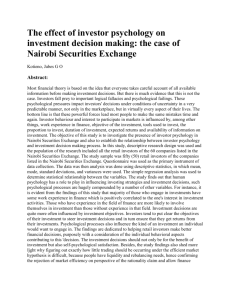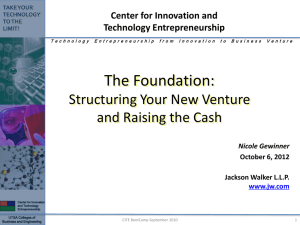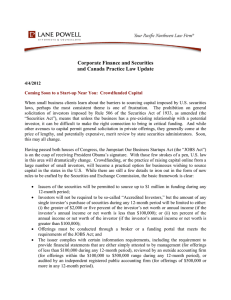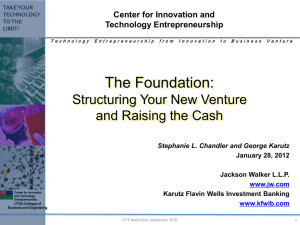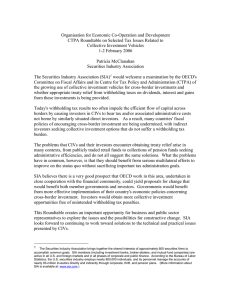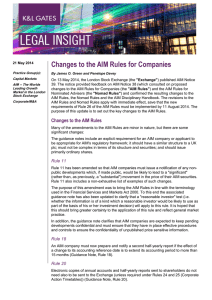This is a reprint of an article that appeared in... Journal as part of a special section on the first...
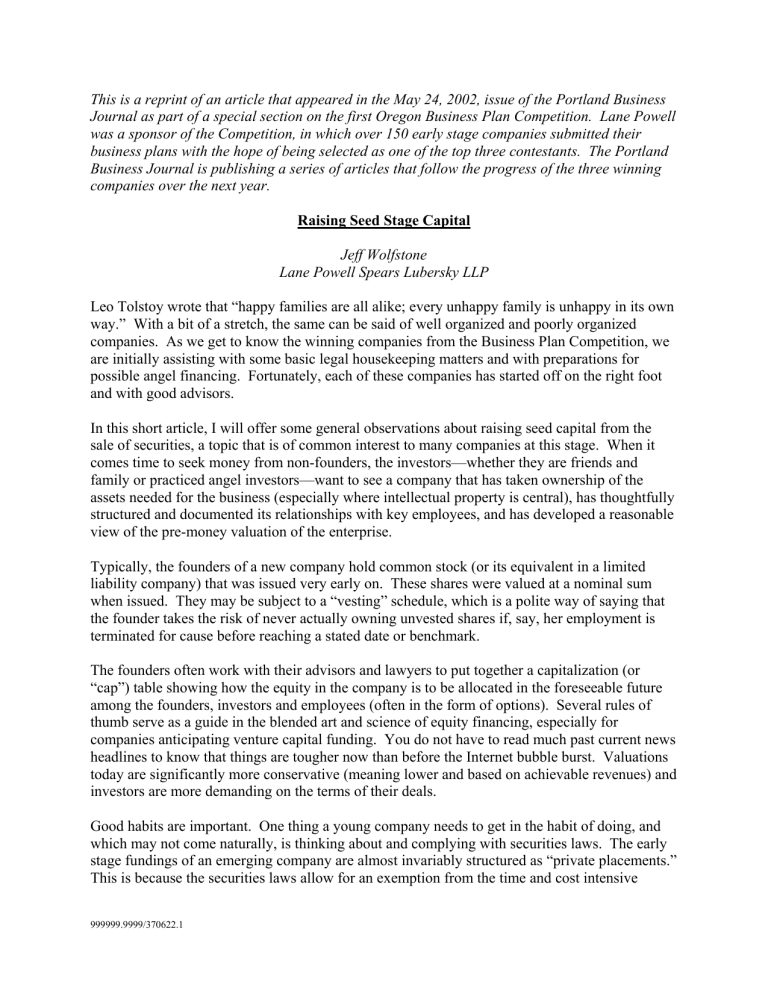
This is a reprint of an article that appeared in the May 24, 2002, issue of the Portland Business
Journal as part of a special section on the first Oregon Business Plan Competition. Lane Powell was a sponsor of the Competition, in which over 150 early stage companies submitted their business plans with the hope of being selected as one of the top three contestants. The Portland
Business Journal is publishing a series of articles that follow the progress of the three winning companies over the next year.
Raising Seed Stage Capital
Jeff Wolfstone
Lane Powell Spears Lubersky LLP
Leo Tolstoy wrote that “happy families are all alike; every unhappy family is unhappy in its own way.” With a bit of a stretch, the same can be said of well organized and poorly organized companies. As we get to know the winning companies from the Business Plan Competition, we are initially assisting with some basic legal housekeeping matters and with preparations for possible angel financing. Fortunately, each of these companies has started off on the right foot and with good advisors.
In this short article, I will offer some general observations about raising seed capital from the sale of securities, a topic that is of common interest to many companies at this stage. When it comes time to seek money from non-founders, the investors—whether they are friends and family or practiced angel investors—want to see a company that has taken ownership of the assets needed for the business (especially where intellectual property is central), has thoughtfully structured and documented its relationships with key employees, and has developed a reasonable view of the pre-money valuation of the enterprise.
Typically, the founders of a new company hold common stock (or its equivalent in a limited liability company) that was issued very early on. These shares were valued at a nominal sum when issued. They may be subject to a “vesting” schedule, which is a polite way of saying that the founder takes the risk of never actually owning unvested shares if, say, her employment is terminated for cause before reaching a stated date or benchmark.
The founders often work with their advisors and lawyers to put together a capitalization (or
“cap”) table showing how the equity in the company is to be allocated in the foreseeable future among the founders, investors and employees (often in the form of options). Several rules of thumb serve as a guide in the blended art and science of equity financing, especially for companies anticipating venture capital funding. You do not have to read much past current news headlines to know that things are tougher now than before the Internet bubble burst. Valuations today are significantly more conservative (meaning lower and based on achievable revenues) and investors are more demanding on the terms of their deals.
Good habits are important. One thing a young company needs to get in the habit of doing, and which may not come naturally, is thinking about and complying with securities laws. The early stage fundings of an emerging company are almost invariably structured as “private placements.”
This is because the securities laws allow for an exemption from the time and cost intensive
999999.9999/370622.1
process of securities registration, provided the rules for a private placement are met. As the term suggests, these transactions are conducted privately, and are not generated from general solicitations to the public. A number of other technical, if not entirely logical, rules must be followed.
An important securities law term commonly encountered in early stage capital formation is the
“accredited investor.” No, this is not a person destined for peerage or having degrees from at least two major universities. Rather, it is a person who meets specified minimum net worth or income requirements. From a money-raising standpoint, dealing only with accredited investors is generally preferred, because the securities laws do not prescribe specific written disclosure requirements for these investors. This does not mean that the company has a license to engage in fraudulent behavior, but only that the cost of the fundraising process may be significantly reduced.
If these young companies we are working with continue to take care in their structuring, maintain good habits in observing legal requirements, and develop effective relationships with their advisors and lawyers the odds are improved that they will reach the business equivalent of adolescence and adulthood. A well organized company, like a happy family, requires proper care and feeding at each stage along the way.
999999.9999/370622.1
2




